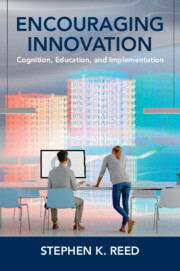Book contents
- Encouraging Innovation
- Encouraging Innovation
- Copyright page
- Dedication
- Contents
- Preface
- Part I Cognition
- Part II Education
- Chapter 6 Improving Skills
- Chapter 7 Learning Theories
- Chapter 8 Teaching Creativity
- Chapter 9 Discipline Creativity
- Chapter 10 Design Education
- Part III Implementation
- References
- Name Index
- Subject Index
Chapter 7 - Learning Theories
from Part II - Education
Published online by Cambridge University Press: 17 August 2023
- Encouraging Innovation
- Encouraging Innovation
- Copyright page
- Dedication
- Contents
- Preface
- Part I Cognition
- Part II Education
- Chapter 6 Improving Skills
- Chapter 7 Learning Theories
- Chapter 8 Teaching Creativity
- Chapter 9 Discipline Creativity
- Chapter 10 Design Education
- Part III Implementation
- References
- Name Index
- Subject Index
Summary
The development of cognitive skills depends on designing curricula based on theories of learning. A knowledge-building perspective utilizes technology to enable students, teachers, and administrators to become active participants in knowledge creation. One of the most important objectives in building knowledge is to establish connections among key concepts, key representations, and real-world contexts. Building knowledge should be a productive struggle so it is helpful to create learning environments that appeal to students’ interests. The ICAP learning theory predicts that learning should increase as students progress from passive to active to constructive to interactive engagement. There is evidence to support problem-based learning in which the curriculum focuses on solving problems in class. Self-regulated learning is promoted by teaching students to formulate goals for self-monitoring and to evaluate their performance. Although teachers should be aware of students’ strengths and limitations, their ultimate goal should be to empower their students to make their own decisions for regulating learning
Keywords
- Type
- Chapter
- Information
- Encouraging InnovationCognition, Education, and Implementation, pp. 81 - 92Publisher: Cambridge University PressPrint publication year: 2023

